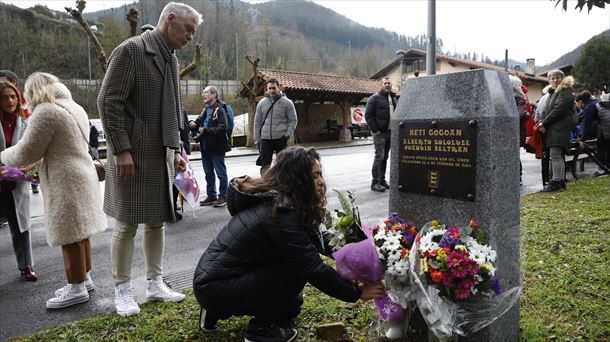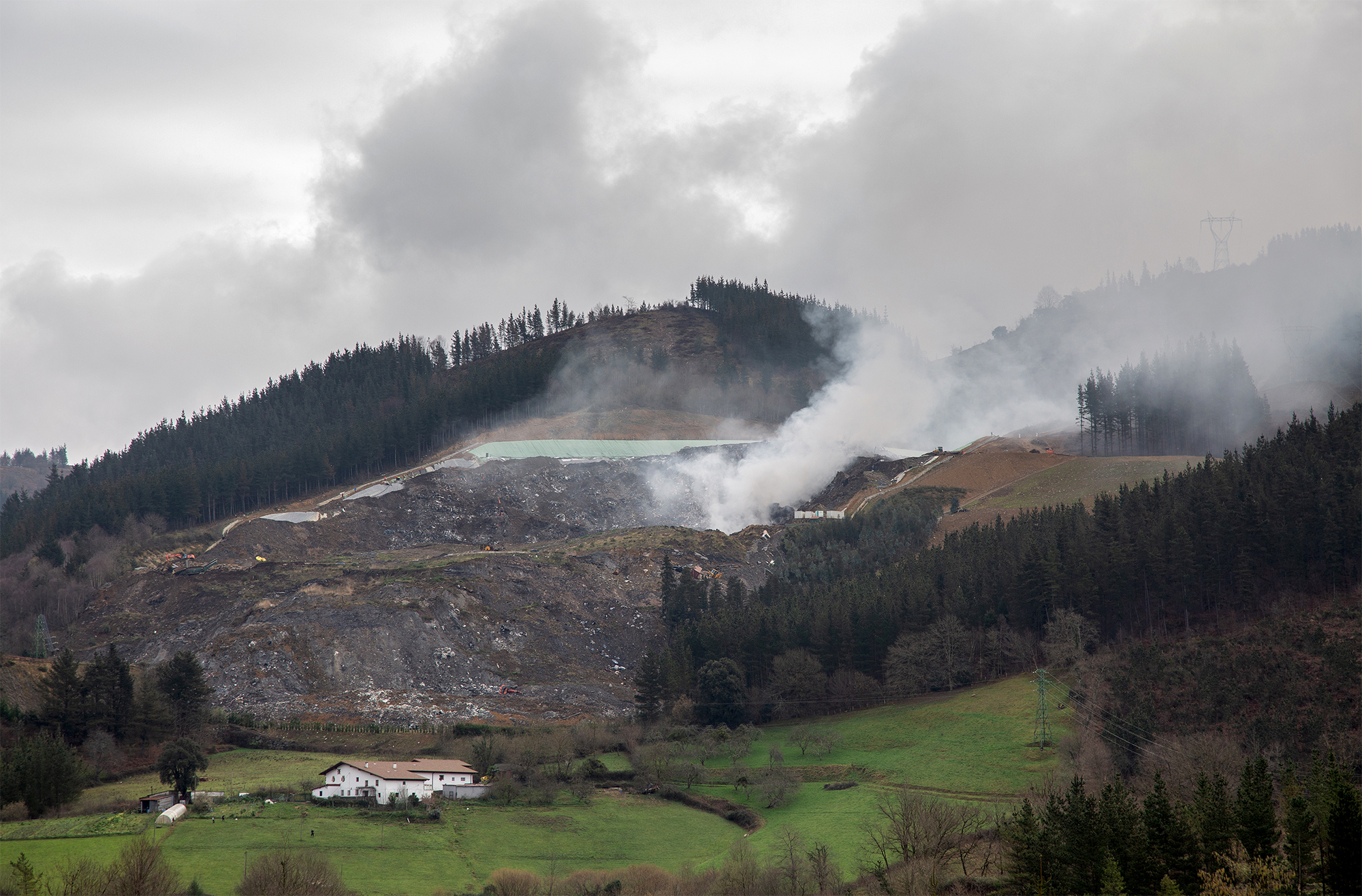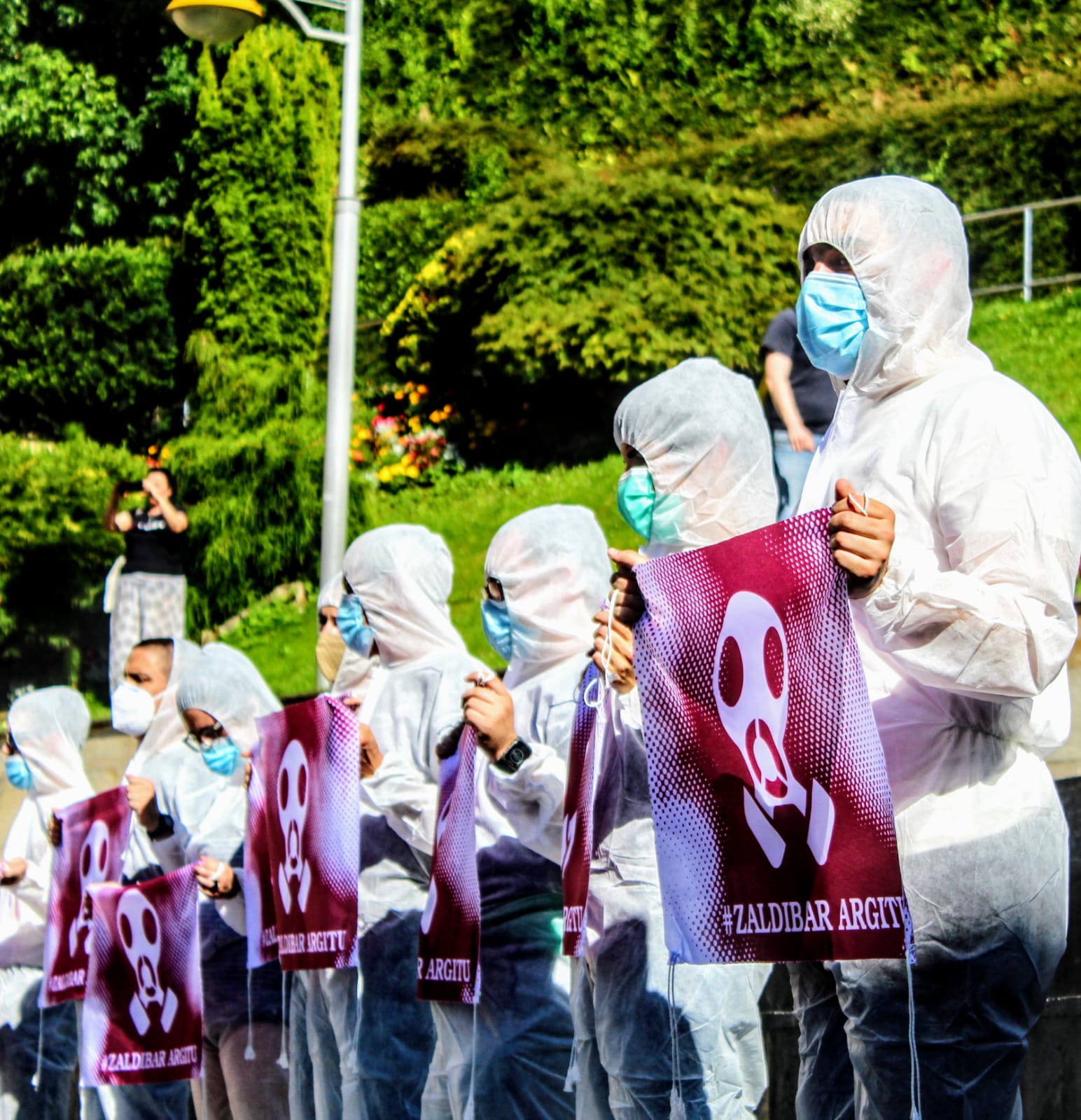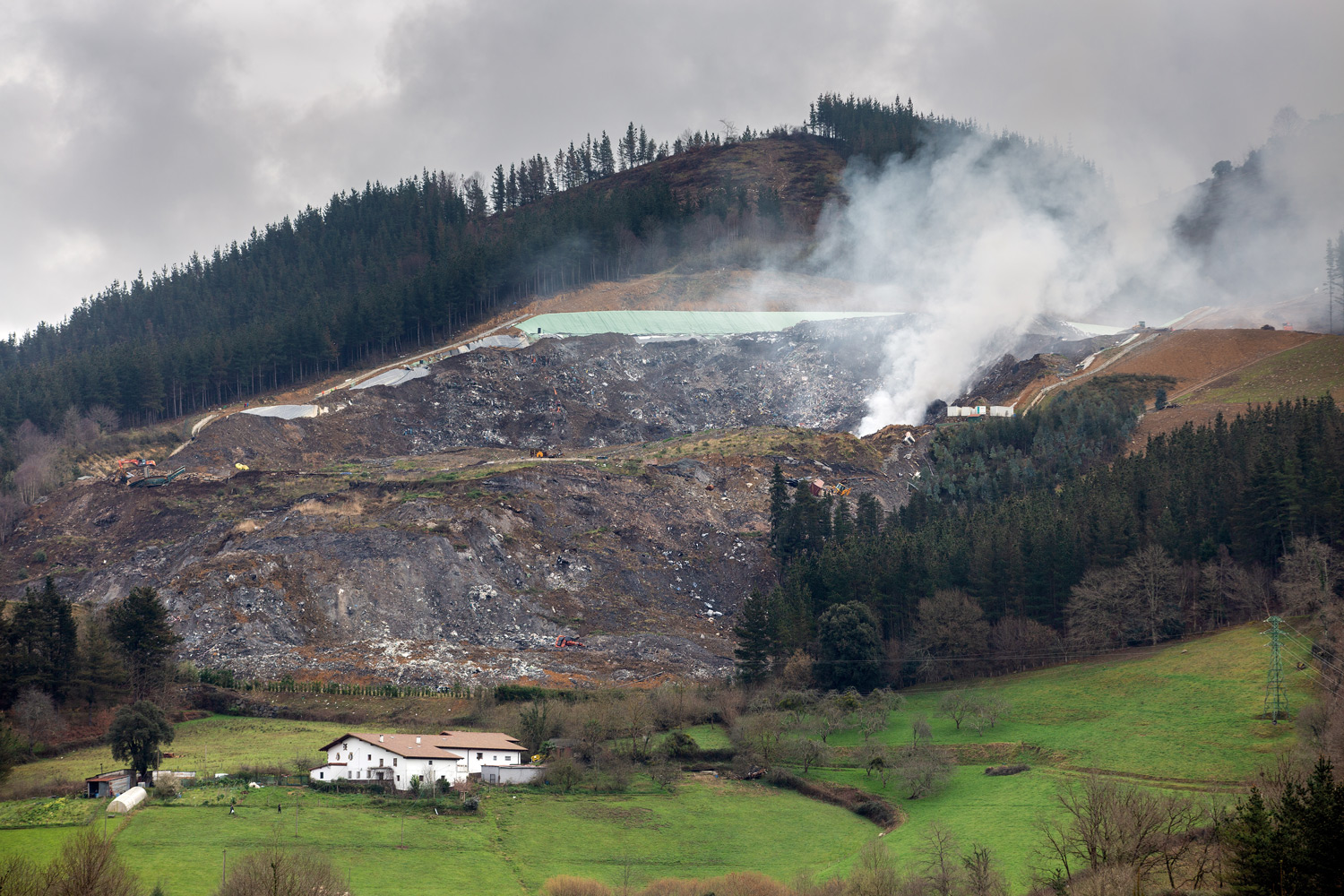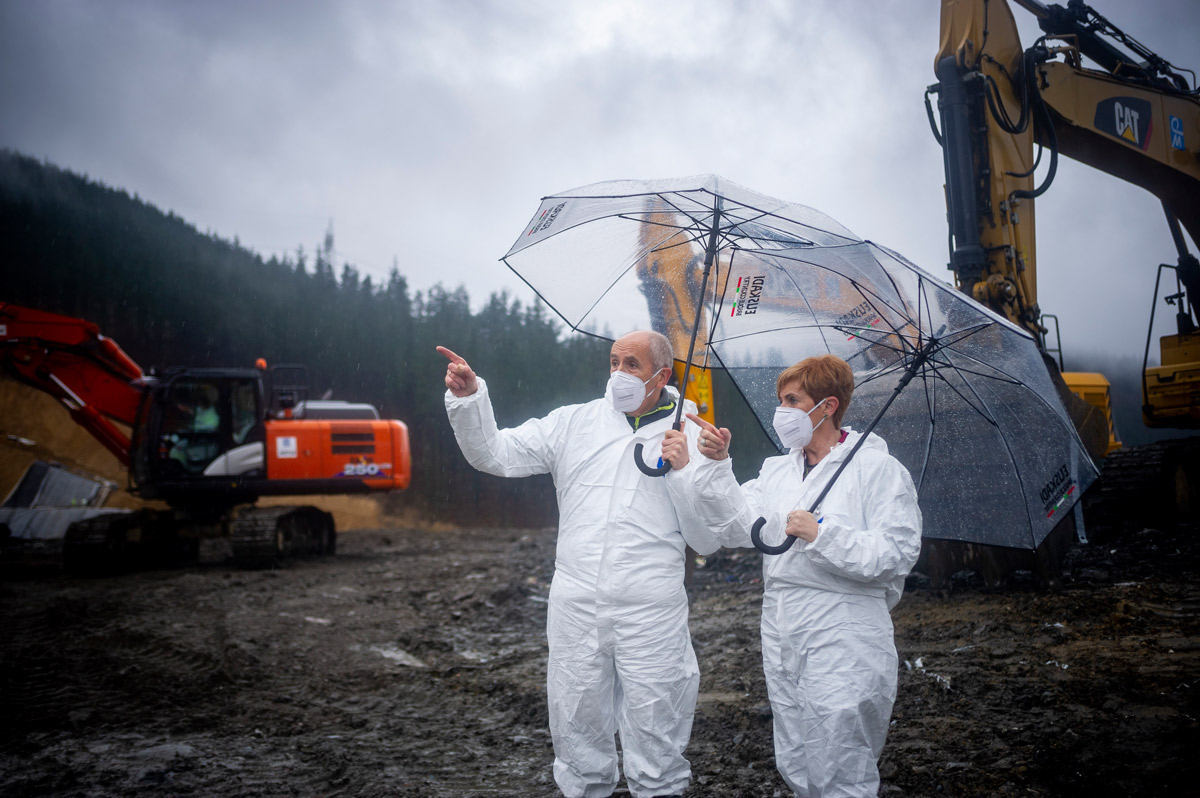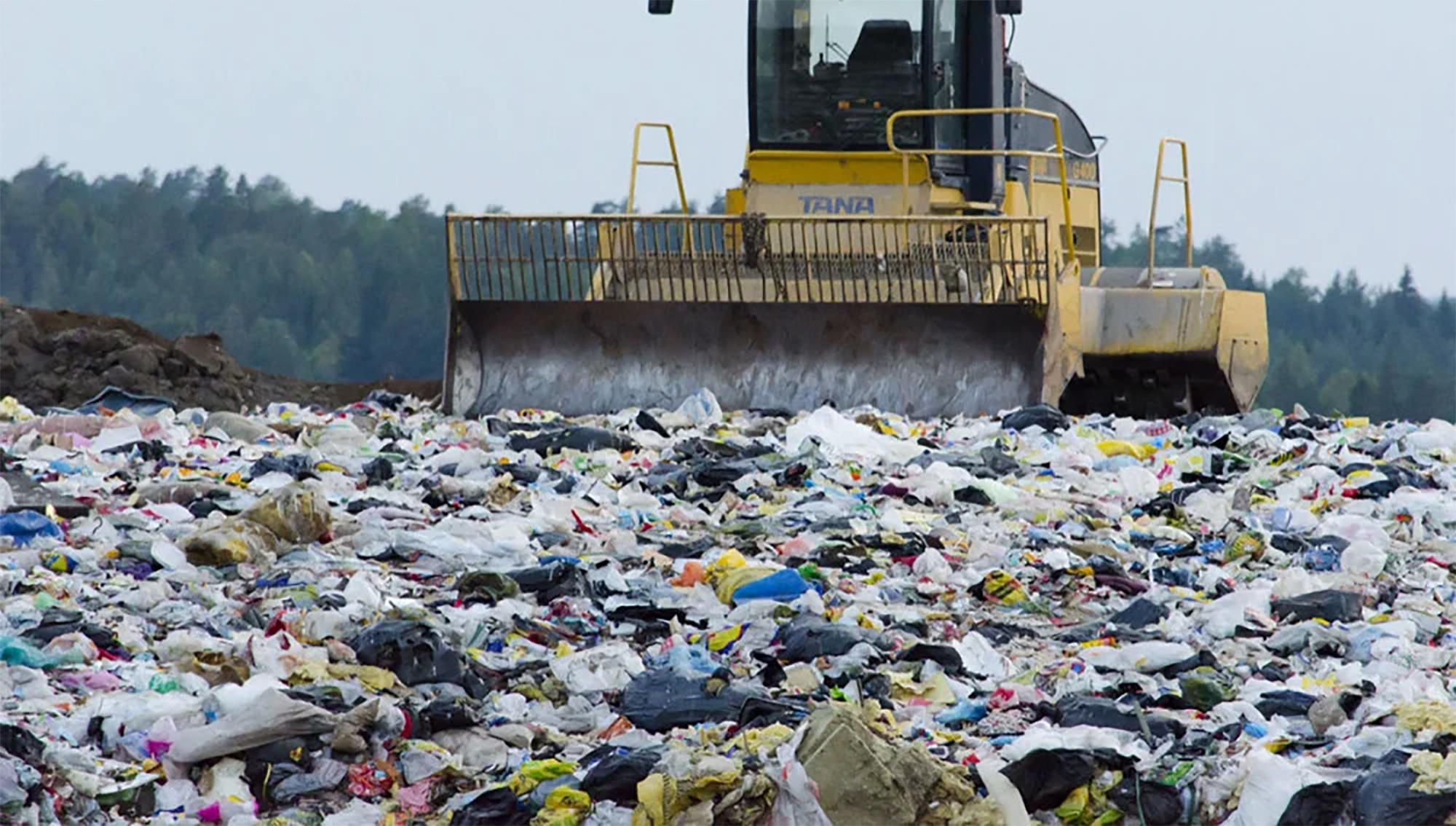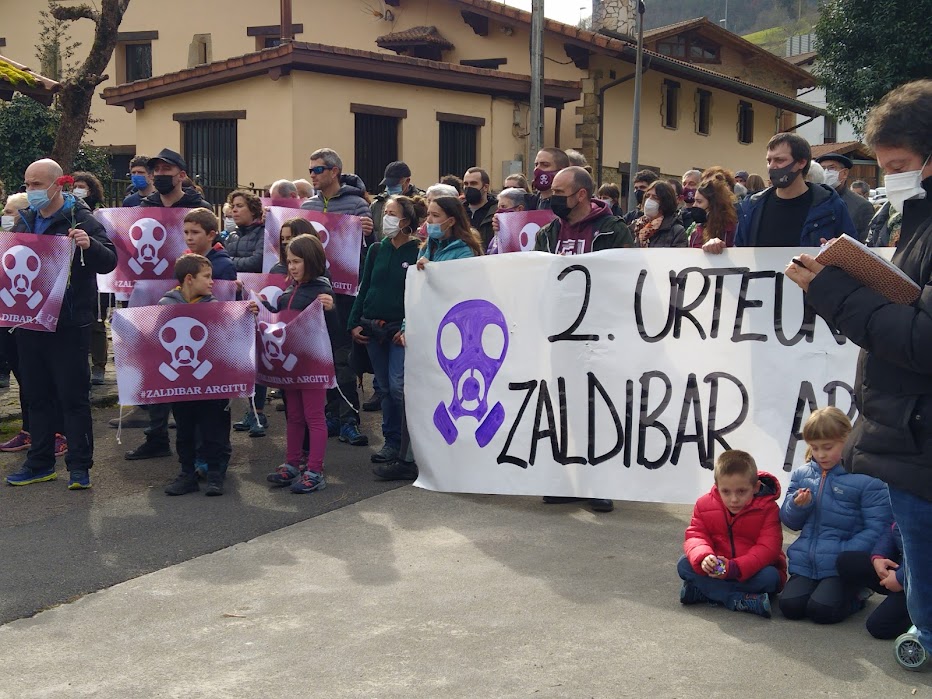"We like to know the line-ups of football players, but not those of our companies"
- Investigative journalist Ahoztar Zelaieta Zamakona has published a book with Txalaparta showing the names behind the Zaldibar case. The inhabitants of the "Basque oasis" have not stalled with the environmental and corruption crimes that incite or tear them apart.
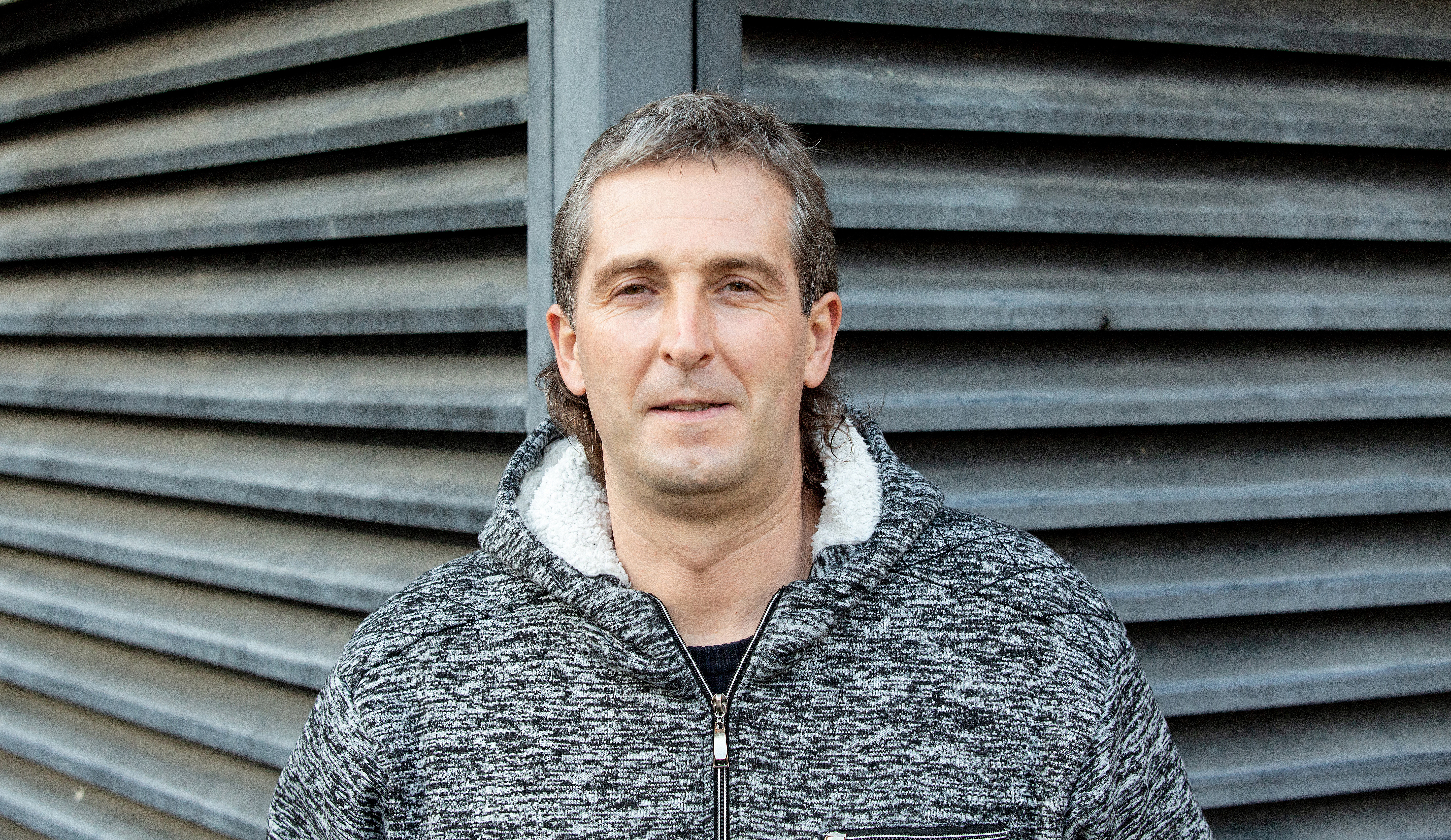
What led him to investigate the issue?
"I've known that mentality ever since I was young: making money on the mountain."
For me, Zaldibar is not a stranger, because his father is a Mallabian who was cured here. In Mallabi we had the Hunger Restaurant and on top of us was the brothel. And over there have been many years of politicians and entrepreneurs: Barinaga's name was not unknown in Mallabi. I have also known that mentality since I was young: to turn the mountain into money.
Professionally, I saw ARGIA echoing the data published by Berria, Berria ARGIA, giving information about Gara Berria, El Salto El Diario, El Diario what was published by El Correo, ARGIA has also ever mentioned El Correo, because he has removed some leaks from his work... and that was what I liked, not only to be dedicated to public administration. The work of the journalists has been to bring to light those information that they wanted to keep secret.
At the beginning of the book he mentions that when the garbage leap closed the freeway, you were caught in the traffic jam. What wall were you on?
No, that's a character. I invented it to give the book a novel form.
Damn it! I'm an idiot, I thought...! And are the sources cited in the book also fictitious?
"When I was talking to a member of Barinaga's family in the Eitzaga neighborhood, I got out of the car two guys, I told him that I had taken the form of a national police force and said, 'No, no, they're mafias.'
They're disguised to preserve their intimacy. But it's not a fictional exercise, they're characters based on reality, and I've reflected what's happened to me. This civilian guard from the Nature Protection Service (Seprona), which is one of the sources, is a civil guard, but is not a civil guard from Seprona. Before the COVID-19 lockdown, I was lucky enough to go to Zaldibar and talk to people for several days, because I don't live in today's dictatorship. And things like this happened to me: having a car following; or when I was talking to a member of Barinaga's family in the Eitzaga neighborhood, two kinds of cars came out, saying that I had become a national police force and said, “No, no, they’re Mafias,” and they took my interlocutor, took him to a corner and asked him what I was doing, what information he was going through...
In the book it recognises a kind of regret, because so far it has not paid much attention to environmental struggles. For an investigative journalist like you, what interesting elements are involved in the issue of waste, as you can see at Zaldibar?
"Zaldibar has highlighted the shortcomings and problems of this admirable model of the Basque oasis"
Zaldibar has highlighted the shortcomings and problems of this wonderful model of “Basque oasis”: clientelism, revolving gates, privatization of public services, corruption, lack of transparency… in my mind these issues were not so related to ecology or the environment. It did more with industry, tourism, services, consultants, etc. When I started researching Zaldibar, I realized that there were the same parameters in this environmental issue. And when I finished the study, I realized that the book wasn't just Zaldibar's, it was an investigation of a management model.
The management model of the “Basque oasis” includes the environment and there are very serious things, not just at Zaldibar. That's why the book has so many annexes at the end, and it tells other questions: because it's important to see that Zaldibar was not an anecdote, but a consequence of a management model. A terrible conclusion. But only a small pyramid stone, severe, red of blood. Two workers are said to have died, others say they have been killed... A freeway has been affected, something very sacred in the “Basque oasis”.
What role do the media play within the “Basque oasis”?
Very large or corporate conventional media do not have an environmental section. The subject appears punctually. There are no specialized journalists, there is no time for it, it is the dictatorship of the present, the precariousness...
"Just as with corruption, we only see the tip of the iceberg of environmental issues"
And just like corruption, we only see the tip of the iceberg of environmental issues. Not only because the media do not pay much attention to ecological crime, but because the sensitivity of Basque public opinion is also very low with environmental crime. Why? Because they're normalized. We've become permeable to them.
The environmental movement is also very sectarized, there have been “divorces”... there are difficulties to generate reaction or sensitization.
The Ertzaintza and the courts, as in the case of corruption, have very poor tools for implementing the environmental crime thermometer. There's no thermometer, so we always see the tip of the iceberg. And as a result, there is no public record to know that they are delineated, and that doesn't help to awaken sensibility. If environmental crimes were recorded, their size, their impact on the quality of life would be studied...
"The Zaldibar case has been very focused on the martyrdom of family members and not on the environment"
At the moment, the Zaldibar case has also been very focused both in the media and in public opinion on the martyrdom of family members, and not on the environment. And yes, it is a crime against workers and it has to be investigated, but it has not focused on the crime against the environment, because behind it there are more forces: the subsidiary responsibility of the public administration. In crimes against the environment, the criminal code calls the victims “diffuse”, because it is not possible to quantify with names and surnames who the victims have been, they are “citizens” in general. There are now particular accusations in the court and to see whether a little work is being done on the environmental crime field.
"In Amurrio, days after the Zaldibar tragedy, there was an accident in a waste company in which a 24-year-old Senegalese died. No ink has been wasted."
In Amurrio, a few days after the Zaldibar event, an accident occurred in a waste company in which a 24-year-old Senegalese died. No ink has been wasted. It is not native, it does not vote, it does not belong to any political party or union, it has no social relations, it is not “integrated” (I hate that word)... And there were no motorways affected!
If we throw a lot of the line on environmental issues, we find the factories of our peoples ...
We like to know the alignments (alignments) of football players, but not the alignments of our companies. Because they're our neighbors, or they've made communion with our son ... The Zaldibar case has sparked a controversy that had long been ruled out, particularly on the issue of household waste, and now the real debate, that of industrial waste, has triumphed. And there are very big interests and a lot of confused people.
"The clientele muscle is so powerful that we have great difficulty reporting. (...) Why haven't you faced that hole so far?"
To be politically incorrect, we've heard the truckers saying they threw anything there, so they too have a moral responsibility. Why haven't they left? Because, of course, his salary and his position were at stake. The clientele muscle is so strong that we have great difficulty reporting. However, I applaud the truckers’ testimony. But the notoriety of this hole has been such that in some sectors it has been given the name of “hole”: both neighbors, truckers and some technicians also called it “hole”. Why haven't you faced that hole so far? Since the 1990s there have been programs in the world of politics and popular movement. However, there have been insufficient mobilizations to bring the whole people together, there has been no articulated mobilization.
"There are now three scenarios: the popular movement, the popular accusations in the trial and the work of politicians in the parliaments. It would be important that these three scenarios, plus that of journalists, were articulated"
Now there are three scenarios: on the one hand the popular movement (Zaldibar Argitu, etc. ), on the other hand the popular accusations at trial, and on the other hand the work that politicians are doing both in the European Parliament and in the Basque Parliament. It would be important for these three scenarios, together with the work of journalists, to be articulated. And I don't see it that way. This would be “the research consortium on Zaldibar”. Among journalists, none of that has been created either. And it's a shame, if that were articulated, we would get to a better port. In addition, Zaldibar’s neighbours would be well informed, parliamentarians would be well sensitised and the popular accusation would feed the two, mentioning what they are investigating and what they are not investigating, and journalists would come to the public via the news and not just the mobilised at Zaldibar Argitu.
You did put in this book the eleven companies, the names and surnames of the owners. Fear?
Nothing, because that information is so heavy that there's hardly a lot of people reading it. It affects you personally, as the book also talks about some relatives. My family is not safe from corruption, some are immersed in the clientele, some are in some political parties -- my friends, my family's friends, the family's -- this country is very small. So here you can make that alignment and keep it in mind. And this alignment has serious consequences on the quality of life of citizens, on the quality of public services, on budgets, on taxes, etc.
"A third black Athletic Goal in the Super Cup finals is not a really interesting point of attention, that does not mark the price of people's bread. On the contrary, the holes generated by the clientele have a lot to do with the price of bread."
But there are so many points of attention that they go so fast, that in the end we don't stay at the points of attention that we really need to be interested in. For example, a third black Athletic Goal in the Super Cup finals is a joy, but that's not an interesting point of attention, that doesn't mark the price of people's bread. On the contrary, the holes generated by the clientele do have a lot to do with the price of bread. But that's what we don't want to realize.
As it has made known in its book, in 1998 the Spanish Government authorised the City of Zaldibar to carry out a popular consultation in the Eitzaga district to see whether or not they wanted to install a landfill. On the contrary, the City Hall said that no response has been received from the Government.
That is what needs to be investigated and that is what some people are involved in, especially the politicians who worked in the opposition at the time. It is necessary to check if there is a letter of Postal certified mail to know whether or not the City Council has received the notification. But, well, I find it strange that the City Hall knows nothing about what has been made public in an official gazette.
When I said this, the first shocked were the political opposition and the neighbours of Zaldibar, who knew nothing. The data was found in the newsletter of the Spanish Courts, as in 2011 a list was published with the referendums that the government authorized at the time.
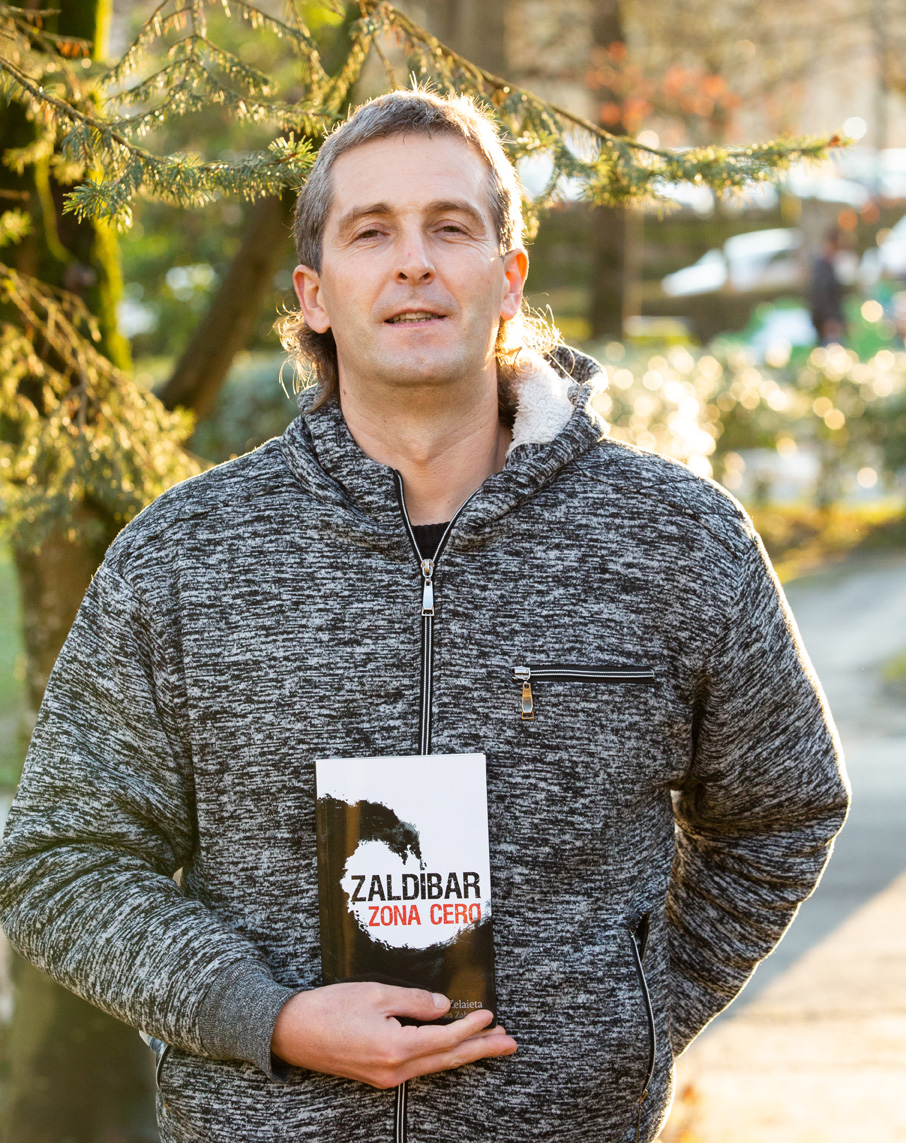
The opening of this landfill was very tense on the part of some, as the opposition it had in the village lengthened the process. What people have been the keys to landfill implementation?
The forestalist entrepreneurs, land buyers and those who, together with José Ignacio Barinaga, participated in the creation of Verter Recycling are of great importance. Since the 1990s, Navarro Murga and Aizpiri have been working on the management of other landfill sites and on the implementation of this landfill: They created the forestalist company Fortin S.L. To buy the land, they became shareholders in the foundation of Verter.
At the local level, the mayor of the PNV, Igor Ormaetxea Arando, and the municipal architect, Iskander Atutxa, modified the subsidiary rules and received a great boost to implement the projects.
"It was Javier Sánchez Martínez, secretary of the mayor of Eibar, Iñaki Arriola, who has been appointed mayor. He was a shareholder of Verter and made several démarches at the City Hall of Zaldibar as representative of Verter"
The former mayor of Galdakao, Patxi Sierra Susumaga, was incapable of being mayor and was appointed Deputy of Administrative Relations and he approved the modification of the subsidiary rules from the Deputation.
Local Javier Sánchez Martínez: She was the secretary of the mayor of Eibar and, with her good social relations, had a great influence on the implementation of the project. It was part of the clientelist system. In addition, he was a shareholder of Verter and made several representations at the City Hall of Zaldibar as a representative of Verter.
Iñaki Arriola himself, ignoring him, allowed Sánchez Martínez to be his secretary and, at the same time, a member of a company. He, as mayor, signed several projects in Eibar, executed by Barinaga or Barinaga family construction companies.
"The government also pushed forward the landfill project: Although in 2012 he was convicted of traffic in hazardous waste, in 2015 he declared it 'the second best landfill of the CAPV'.
The Basque Government also promoted the project, whether it had been launched or not. Administrative silence was used to avoid intervention, among other things. But he also pushed the project forward with an initiative: Despite being sanctioned in 2012 for dealing with hazardous waste, in 2015 the Basque Government declared it “the second best landfill of the CAPV”. In the last inspections, although Verter did not pass the examination, and although he found sufficient voids to file a complaint, he did not report it. A file was opened to him but he was not denounced.
At these higher levels it was also promoted by Josu Jon Imaz, who with his decree promoted the “minimum intervention” of public institutions. It was a European decree that came under pressure from the waste lobbies, but it would have to do with the experts if Josu Jon Imaz led the decree further to the CAV. But, of course, he is now the second leader of Repsol, the company of Repsol that charges the most GDP among Spanish companies.
There are many who, after abandoning the policy, have gone to waste business companies or work in the waste business lobby. Other politicians have privatized public landfill monitoring services, and other politicians have created private companies to manage these services when they have left politics. Such things are reproached in Madrid and Valencia, they are highly criticised, they have a great deal of scrutiny. But the radiance of the “Basque oasis” does not let us see that.
It has also shown the relations of the owners of Verter with the URA agency and the Environment Department that they were going to carry out checks following the fall of the Zaldibar landfill.
"At the time of the landfill fall, Ernesto Martínez Cabredo was director of the URA agency and president of it in the company Zuribar created by José Ignacio Barinaga and Arrate Bilbao (both charged in the case of Verter)"
At the time of the disaster, Ernesto Martínez de Cabredo was the director of the URA agency. He was director of the construction company Amenabar until 2016 and Arriola took her to URA; currently he is director of Eusko Trenbide Sarea, as Arriola has carried her with him. At the time of the landfill fall, Martínez Cabredo was president of the company Zuribar created by José Ignacio Barinaga and Arrate Bilbao, both charged in the case of Verter.
At the time, the Barinaga family created the company Matxaria with the intention of managing a landfill in Eibar, and Mónica Pedreira Lanchas, current director of the Environment of the Provincial Council of Gipuzkoa, was appointed as its advisor. Don Iván Pedreira, brother of Lanchas, director of the Environmental Administration at the time of landfill fall. Therefore, on the phone of José Ignacio Barinaga there were a number of people in charge of the Environment area of the PSOE.
The appointment by Verter of Juan Etxeberria Elosegi (currently charged) as technical director was a way of reaching out to the PNV as well. His uncle, Ignacio Etxeberria Monteberria, a former PNV deputy and president of Indumetal, is an entrepreneur who works with hazardous waste and who now works. His father, Juan José Etxeberria, former president of Bankoa, and former president of Luzaro society, has been arrested in Bilbao. The Basque Government is a member of the Vitoria-Gasteiz Executive and granted Verter a loan of EUR 400,000 in 2009.
This is the solidarity of the “Basque oasis” or the lack of egoism of the PNV: it knows how to share its clientele well and when there is a problem, everyone is involved. How easy it would be to present Iñaki Arriola as head of Turkish at a press conference and to be decided by public opinion. But you cross so many networks of customers that if one of them falls, the others can also fall. In addition, the PSOE brick man is Iñaki Arriola. If the PSOE had asked itself, its hyper reaction would have been very hard.
"Arriola has gotten stronger after this issue!"
Not only that, Arriola has strengthened her muscle after this issue! He has continued to be a counsellor, Eneko Andueza, former secretary of the Eibar, is spokesman for the PSOE parliamentary group, and Arriola has brought with him several people we have talked about, such as Ernesto Martínez Cabredo, Iván Pedreira Lanchas... In this respect, Zaldibar's has not taken its toll, it has come out stronger! And there we have to look at ourselves, what we haven't done right.
Revolving doors, clientelism... and party financing?
If Barinaga speaks! (...) the world would vibrate"
If Barinaga speaks! Barinaga would give her that opportunity: you are also a small stone in the clientele pyramid, but if you speak up, and you explain why you were talking about affiliates in so many matches and why you were talking about having parties in the Txokos dinners in your pocket, because you've been put in a lot of money, etc., the world would vibrate.
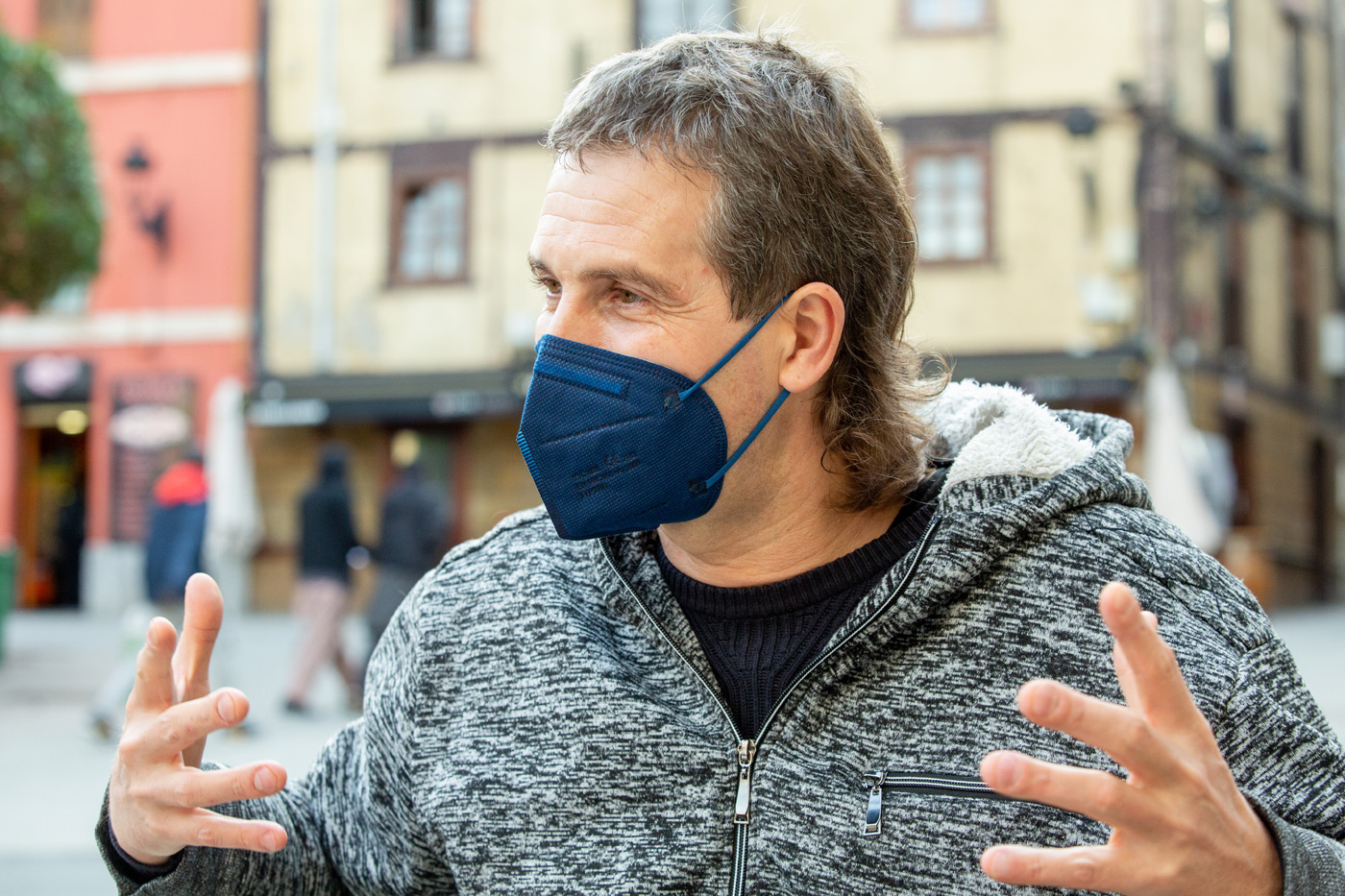
Something new about asbestos?
For the trial, the Ertzaintza has commissioned Osalan to report on asbestos in the past few hours. According to these documents, in May 2019 the Department of Labor and Justice of the Basque Government rejected the work plan of the Ertzaintza. The work plan determines how the company is going to treat asbestos, how it is going to protect workers, how asbestos fibre is not going to be transmitted to the environment... and that plan did not pass the test, as it presented many deficiencies. Among these shortcomings are the following issues that today provoke a great salsa: who was going to wash the clothes of the workers, how many hours I could not work with asbestos... and another interesting lack, which I am most interested in, is that until 2017 Verter was not “in the register of companies at risk of asbestos” and was taking asbestos since 2012, and it is an indispensable condition to work with asbestos to be in that register. The report, rejected by the Basque Government, points out that the name in the register in place of Verter was Amiantec, the company to which the work plan was carried out. But the Basque Government, after rejecting this work plan because of its shortcomings, hired another company to carry out a work plan and registered in the register of companies at risk of asbestos.
"The Basque Government is now hiring the company Amiantec who tried to deal with the legality of asbestos for Verter"
And now what it is going to be and Amiantec has been hired by the Basque Government to disarm the Verter landfill in Zaldibar! The Basque Government has now hired the same company that tried to deal with the legality of asbestos Verterri! This is what disguises and people don't want to hear, because they want to simplify their lives. People don't want problems and they want to think that public management is alien to them.
The book lists the companies that have obtained contracts from the Basque Government to resolve the Zaldibar disaster: a total of 11, all of them revolving doors of the PNV.
"Verter is the one that creates an environmental problem, and the Basque Government advances all the money it has to pay for repairs. Suspect, isn't it? Most of these 27 million are going to build Moyua but no single list of all emergency contracts has been published from the point of view of transparency."
Verter creates an environmental problem and the Basque Government advances all the money from repairs. Suspect, isn't it? Most of those 27 million are going to build Moyua, but from the point of view of transparency a joint list with all emergency contracts has not been published.
The Basque Government says that in April it sent the first invoice to Verter for an amount of EUR 3.4 million. What we do not know is whether Verter has paid or can even pay, because he is bankrupt. Since then, we do not know whether another invoice has been sent to you.
In contracts relating to air and water quality for the repair of Zaldibar there are companies created by the Burukides of the PNV. When they're in public office, they privatize public services so that when these kinds of businesses emerge, they're their first companies. That's very normalized, like the Job Search Batzoki being a better office than Lanbide. They are the glaring employment offices which rob the equal opportunities of citizens, the basic principle of Democrats. And nobody's going to burn a Batzoki for that.
If the company’s creator for the provision of environmental services does not have a surname such as Imaz, Egibar or Arzallus, it has nothing to do with the other companies in the competitions. Are these other companies better? No, but they have a surname. And they encompass their resume so much that when they show up for competition in the third year, the others have nothing to do. In addition, they present themselves “we are able to manage public services, we know how to do it because we have made several contracts”… Of course, but how? Stepping on who? Frustrating the free market, sacred also for them, creating monopolies. The monopoly is also key at Zaldibar and annoys many of the right-wing parties, including PNV voters who have never taken the PNV elevator, because at stake is also the profession of their children.
What do you know about judgment? In the book he explains that the lawyer who has hired Verter for the trial is Pedro Learreta Olarra, member of the law firm Garrigues.And that this office was hired by the Provincial Council of Gipuzkoa in 2016 to prepare a report favorable to the incinerator.
As has been seen in the case of De Miguel, some public money lawyers have been defending others who, in other trials, have been stealing public money. Of course, anyone should be able to defend themselves. But it's interesting to know that there are lawyers who are money machines.
"According to the instruction of the Ertzaintza, the report submitted by Verter to the Basque Government makes it clear that in the years 2018 and 2019 stability was not guaranteed and that "any scenario" was foreseen, even the one that occurred. The government therefore knew that it could have happened."
We're going to publish the second edition of the book, because the first edition that was published in October has now been exhausted, and I've updated it, because the filtering of the book came just when the book was over, and I could just put a little bit of it in. In the second edition I put everything in. There is interesting data, for example, how the records were, which companies entered; what arguments the Ertzaintza has to make the imputations, and one of the ones that has not been worked so far is a report sent to the Basque Government by Verter: According to the instruction of the Ertzaintza, the report submitted by Verter to the Basque Government makes it clear that in 2018 and 2019 stability was not guaranteed and that “any scenario” was foreseen, even what happened! The Basque Government therefore knew that it could have happened.
It will also be important to clarify how the last days of the landfill were. What meetings were held to analyze stability, what doubts were there... There are two sentences in the Ertzaintza instruction. On the one hand: “José Ignacio Barinaga shows no concern when geologists and environmental consultants warn him that there is a serious problem with stability.” And on the other hand: “When the situation was explained to him, the technical director said he was thinking about calling the administration.”
Visiting urban waste collection and reduction sites should be a compulsory school tour. Open a cookie pack to swallow two inner cookies and mentally construct the package surface path. The shame of human activity lies in destiny. Ultimate desolate landscape of the sins of... [+]









